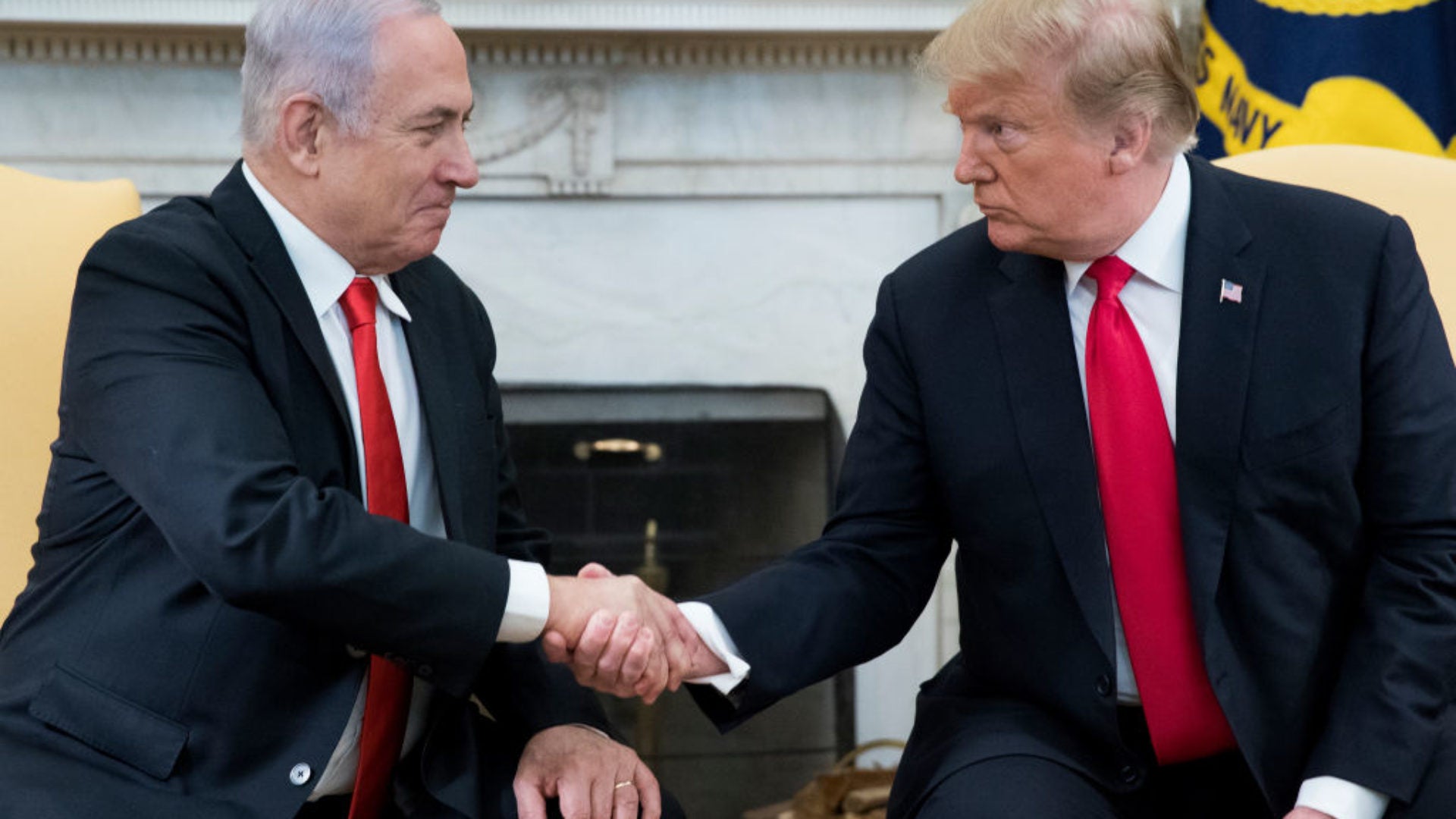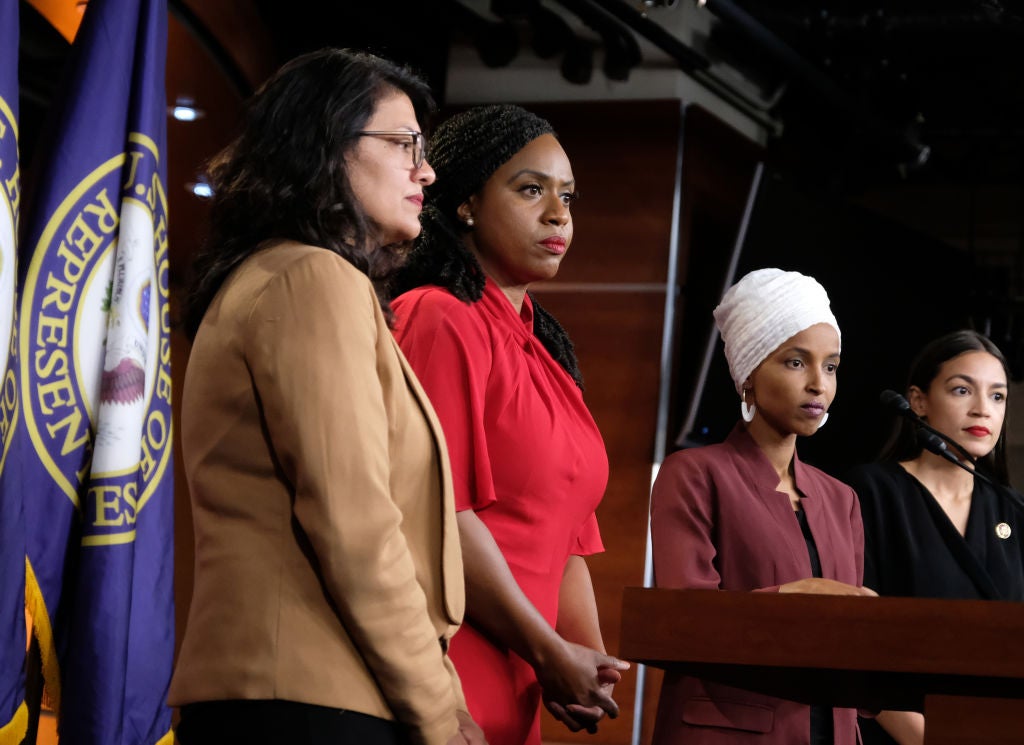
After President Donald Trump tweeted that progressive Reps. Ilhan Omar (D-Minn) and Rashida Tlaib (D-Mich) “hate Israel and all Jewish people,” urging Israel to deny them entry into the country ahead of a planned visit, Israeli Prime Minister Benjamin Netanyahu did as he was told.
“The plan of the two Congresswomen is only to damage Israel and to foment against Israel,” Netanyahu said in a statement following the decision. “They have defined the destination of their visit as ‘Palestine’ and not ‘Israel.’ And unlike all the Democrat and Republican congressmen who have visited until today, they avoided asking any meeting with any Israeli official, whether in the government or in the opposition.”
Both Omar and even more so Tlaib, who is Palestinian-American, have been outspoken in their criticism of Israel’s occupation of Palestine and the genocidal, sustained violence being inflicted upon the Palestinian people.
Israel’s Deputy Foreign Minister Tzipi Hotovely also confirmed Israel’s decision on Twitter.
“The State of Israel respects the American Congress in the framework of the close alliance between the two countries, but it is unthinkable that an entry to Israel would be allowed to those who seek to damage the State of Israel, even during a visit,” Israeli Interior Minister Aryeh Deri, the official authorized by law to make the decision to ban Omar and Tlaib, said. Deri made it clear that he did so with Netanyahu’s and other Israeli officials’ support, CNN reports.
Rep. Ayanna Pressley (D-Mass) quickly tweeted support for Tlaib and Omar in the wake of two world leaders banding together to repress the pair’s political freedom and freedom of speech. She then issued the following statement:
“When you attack one of us, you attack all of us. Netanyahu is stoking division and punishing dissent just like the occupant of the White House. Congresswomen Omar and Tlaib are my dear friends, my sisters in service and hardworking Americans who have been subject to some of the most vile and vicious attacks simply for being who they are. They are duly elected members of Congress and we cannot allow them to be marginalized, discriminated against, nor targeted because of their gender, their religious beliefs, nor their ethnicity. That is not who we are as a country and we should reevaluate our relationships with any country who seeks to ban Americans and threatens the safety of anyone, including government officials.”
Still, while the political dialogue following Israel’s decision to deny two sitting members of U.S. Congress entry into the country has been framed as a potential widening rift between Republicans and Democrats, it’s highly doubtful that will be the case beyond political theater.

Democrats have long made their allegiance to Israel clear, including former President Barack Obama. The 44th president continued the U.S. tradition of bankrolling Israel’s continual assault on Palestinians, specifically through giving Israel well over $500 million to fund its Iron Dome missile program, which Israel has been using since 2011.
The United States has licensed, paid for and delivered more than 670 million weapons and related equipment to Israel, including almost 500 categories of weapons,” the LA Times reports.
Further, the United States Army recently finalized plans to purchase the Iron Dome weapons system.
Sen. Cory Booker (D-New Jersey), currently a 2020 Democratic presidential candidate, has also made his allegiance to Israel clear, stating to an AIPAC delegation in March, “Israel is not political to me. I was a supporter of Israel well before I was in the United States Senate.”
Then paraphrasing Psalm 137:5 in the Bible, Booker continued, “If I forget thee, O Israel, may I cut off my right hand.”
Sen. Kamala Harris, also a 2020 Democratic presidential hopeful, sided with Republicans in 2017, “criticizing President Obama’s “refusal to veto an otherwise-unanimous, very modest, and largely symbolic UN Security Council resolution on Israeli settlements…[which called for] Israel to stop expanding its illegal settlements in the occupied West Bank, which violate the Fourth Geneva Convention and a landmark ruling by the International Court of Justice,” Foreign Policy in Focus reports.
“I believe that when any organization delegitimizes Israel, we must stand up and speak out for Israel to be treated equally,” Harris said during an AIPAC speech a few weeks later. “That is why the first resolution I co-sponsored as United States senator was to combat anti-Israel bias at the United Nations and reaffirm that the United States seeks a just secure and sustainable two-state solution.”
Sens. Bernie Sanders (D-VT) and Elizabeth Warren (D-Mass) have both become increasingly vocal in criticizing Israel’s occupation of and violence against Palestine, but they are not in the majority—nor are they consistent on this issue. So, it remains to be seen what, if any, impact Trump’s and Netanyahu’s decision to ban Omar and Tlaib from Israel will have on political relations in the U.S. between the two major parties—and especially what, if any, impact it will have on the United States’ relationship with Israel overall.
My money is on a whole lot of “sound and fury, signifying nothing.”
In 1997, anti-apartheid freedom fighter and South African President Nelson Mandela said it best:
“[Freedom for the] Palestinian people is the greatest moral issue of our time…the temptation in our situation is to speak in muffled tones about an issue such as the right of the people of Palestine to a state of their own. We can easily be enticed to read reconciliation and fairness as meaning parity between justice and injustice. Having achieved our own freedom, we can fall into the trap of washing our hands of difficulties that others face.
“Yet we would be less than human if we did so.”
While I would like to believe that this blatant show of political aggression and suppression will cause the Democratic Party to reckon with its own complicity; it is much more likely that this moment becomes one more “how dare Trump do this” moment, rather than anything of substance.
And if history serves as any indication, all will be well by the next AIPAC conference.